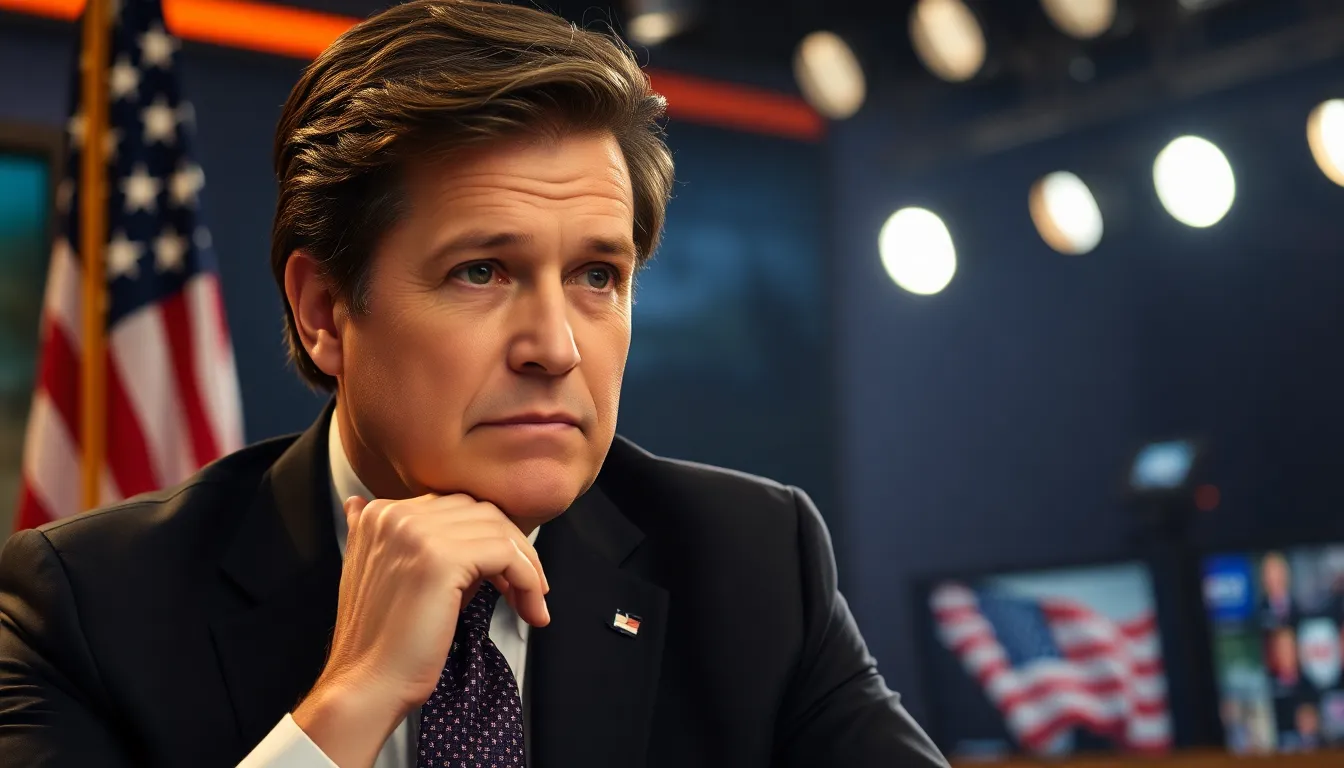Tucker Carlson is a name that sparks debates faster than a cat on a hot tin roof. With his sharp wit and polarizing opinions, he’s become a staple of American political discourse. But the burning question remains: is he really a Republican or just a master of the political masquerade?
As viewers tune in to his nightly show, they’re left wondering if he’s the poster child for the GOP or simply a provocateur playing the field. With his knack for stirring the pot, Carlson’s political identity isn’t just a matter of party affiliation; it’s a captivating puzzle that keeps audiences guessing. Dive into the whirlwind of opinions, controversies, and political antics to unravel the truth behind Tucker Carlson’s allegiance.
Table of Contents
ToggleBackground on Tucker Carlson
Tucker Carlson has emerged as a key influence in American political media. His background provides insight into his current political stance.
Early Life and Career
Born on May 16, 1969, in San Francisco, Tucker Carlson grew up in a family involved in journalism and media. Early exposure shaped his perspective on political issues. After graduating from Trinity College in 1991, he began a career at The Weekly Standard, where he developed a conservative voice. Transitioning from print to broadcast, Carlson co-hosted Crossfire on CNN, making his mark as a debater. His further ventures included stints at MSNBC, where he hosted a show before joining Fox News in 2016. Success at Fox escalated his profile as a prominent conservative commentator.
Political Alignment Over the Years
Carlson’s political alignment has sparked considerable discussion. Initially, he embraced a traditional conservative viewpoint, aligning closely with the Republican establishment. Over time, his rhetoric shifted, emphasizing populist themes that resonate with a broader audience. He critiques both Democrats and establishment Republicans, often positioning himself against elite politics. This evolution raises questions about his loyalty to the Republican Party. While he supports key conservative policies, his controversial statements suggest a complex, independent streak within his political identity. Carlson’s commentary continues to challenge the boundaries of mainstream Republicanism.
Analysis of Carlson’s Political Views

Tucker Carlson’s political views reveal a complex identity navigating between traditional conservativism and populism. His approach sparks debate among viewers and analysts alike.
Commentary Style and Tone
Carlson’s commentary embodies a blend of outrageous and confrontational elements. The tone often challenges mainstream narratives while appealing to a broad conservative audience. Viewers find his style both captivating and divisive, as he tackles contentious topics with flair. Many appreciate his willingness to address societal issues head-on, while others criticize him for sensationalism. His narratives resonate particularly well with those disillusioned by establishment politics.
Key Issues and Stances
Carlson’s stance on immigration maintains a hardline perspective, advocating for stricter border controls. He emphasizes the need for American sovereignty and critiques policies he views as detrimental. Economic inequality often surfaces in his discussions, with a focus on working-class struggles against elite interests. Healthcare and environmental policies also receive attention, as he questions mainstream media narratives. His views on these key issues reflect a disdain for both major political parties when they fail to represent the average American.
Relationships with the Republican Party
Tucker Carlson’s relationship with the Republican Party is multifaceted and dynamic, reflecting his complex political identity. He often engages with various party figures and influences broader conservative narratives.
Connections with Republican Figures
Connections with Republican figures mark a significant aspect of Carlson’s public persona. Numerous interviews and discussions reveal his interactions with prominent Republicans like Donald Trump and Josh Hawley. During his tenure at Fox News, he has showcased these relationships, leveraging them to amplify his critiques and alignments. Carlson frequently provides a platform for Republican voices while simultaneously challenging the establishment. His rapport with key party members illustrates the blend of support and contention that characterizes his position within the GOP.
Contributions to Republican Discourse
Contributions to Republican discourse underscore Carlson’s influence on conservative thought. He shapes discussions around critical issues, such as immigration, health care, and economics. His assertive commentary provides fresh perspectives on the GOP’s approach while resonating with grassroots supporters. Several Republicans cite his work as pivotal in swaying public opinion and galvanizing voter bases. Carlson’s unique approach has sparked significant debate, leading to a reevaluation of traditional conservative values.
Public Perception of Carlson’s Politics
Public opinion on Tucker Carlson’s politics remains varied and nuanced. Some view him as a genuine representative of Republican values, while others consider him a provocateur.
Support from Republican Voters
Support for Carlson among Republican voters is substantial. Many fans appreciate his straightforward approach to controversial topics. Polls indicate that a significant percentage of conservatives find his commentary aligns with their views. Interest in his populist rhetoric further solidifies his popularity within the party. Grassroots supporters often resonate with his critiques of both major political parties. His focus on issues like immigration and economic inequality appeals to many within the Republican base. Overall, a loyal group of viewers consistently tunes in for his perspectives.
Criticism from Political Opponents
Criticism directed at Carlson typically stems from both Democrats and establishment Republicans. Detractors frequently label his views as divisive and incendiary. Some argue that his populist approach undermines traditional conservative principles. Major media outlets often scrutinize his statements, highlighting controversial remarks that ignite public debate. Opposition voices claim he promotes misinformation, particularly regarding topics like immigration policy and healthcare. Such pushback reflects broader concerns about his influence on political discourse. Overall, Carlson remains a polarizing figure, generating significant reactions across the political spectrum.
Tucker Carlson’s political identity is a tapestry woven from traditional conservatism and modern populism. His ability to engage audiences while challenging both Democrats and establishment Republicans has solidified his status as a significant voice within conservative circles. While many view him as a champion of Republican values, others see a provocateur whose rhetoric complicates the party’s narrative.
As he continues to influence political discourse, the debate over his true allegiance to the GOP remains a topic of interest. Carlson’s unique approach not only shapes discussions but also reflects broader shifts within the Republican Party. His impact on conservative thought ensures that he will remain a focal point in the evolving landscape of American politics.







